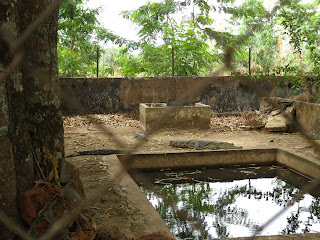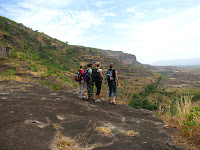
Mamadou prayed silently to himself, asking God for just one more ounce of courage as he waited alone at the Mercy Ships patient screening in Conakry, Guinea. Mamadou tried to blend in with the other adults, silently shifting from chair to chair as the line-up of patients advanced.As he waited, Mamadou held his arms, bent inward at the wrists and elbows, close to his chest. He felt awkward and uncomfortable. So many times in his life people had insulted him and chased him away as they yelled, “That boy is cursed! His arms are devil arms!”
Mamadou had not told his family – including his Aunt Hadja, with whom he lived – that he had come to the Mercy Ships screening. He did not want to disappoint anyone if he could not have surgery. Mamadou lived with his aunt in Conakry so he could beg on the traffic-choked streets. His mother and father, in the city of Mamou, had tried to find an apprenticeship for him so he could have an occupation, but his arms were not strong enough to carry wood or hammer nails. So, because the family was desperately poor, they relied on their eldest son to use his deformity to earn money for the family by begging.
But Mamadou wanted something much different for himself, and all he needed was arms that looked normal. If he had no deformity, he would not be expected to beg. He wanted to use his sharp intellect to learn English, as this language came easy to him. And if he looked normal, it would not be strange at all if he supported his family through his own business.Mamadou knew he could do those things now, even with bent arms, but he was the only one who could see past his deformity. As Mamadou confided to the Mercy Ships nurse who examined him, “I can do much more than people think.” He added proudly, “I make good use of my arms to take care of myself and help support my family. I do not want to beg for the rest of my life, but I have learned to do it very well. With the money I earned from begging, I bought sheep. Now, the lambs from those sheep feed my family.”
 Mercy Ships was Mamadou’s only hope, and he was grateful to be accepted for treatment. He now felt comfortable sharing the good news with his parents. Mamadou explains, “My condition was a huge burden on my parents. There was so much disappointment and shame that I had to beg for the family to survive. I wanted to be certain that Mercy Ships would do my surgery before I said anything to them.”
Mercy Ships was Mamadou’s only hope, and he was grateful to be accepted for treatment. He now felt comfortable sharing the good news with his parents. Mamadou explains, “My condition was a huge burden on my parents. There was so much disappointment and shame that I had to beg for the family to survive. I wanted to be certain that Mercy Ships would do my surgery before I said anything to them.”His mother and his one-year old sister came to stay with him. His father assured him that the family would get by during the many months that Mamadou would be in the hospital and recovering. Relatives would be called upon to help, and Thierno would find extra work in Mamou. They wanted to support Mamadou’s dream of having his own business and living like any normal young man. Onboard the Africa Mercy hospital ship, volunteer plastics surgeon, Dr. Tertius Venter, explained Mamadou’s rarely seen condition. “Mamadou was born with radial club hands and only four fingers on each hand. The front sides of his hands are underdeveloped and bend downward on an angle. His elbow joints have also been affected. On his left arm, the joint is working fairly well – but, on the right side, the joint is stiff and cannot bend all of the way.”
Since Mamadou’s left elbow was functional, Dr. Tertius proceeded with a two-stage rehabilitation of the left arm.In the first surgery, Dr. Tertius aligned Mamadou’s left hand with his forearm. In six months, when Dr. Tertius returns to Mercy Ships, he will take Mamadou’s index finger and reposition it to create a thumb. Mamadou’s left arm will look and function almost completely normally. Sadly, Dr. Tertius determined that no surgery could improve the functioning of Mamadou’s right arm. He explained to Mamadou, “With your right elbow joint in its bent position, like it is now, your right hand is close enough to your body and other hand to be of help. But that right elbow joint can never be made to move and flex. All I can do is set the elbow joint so that your arm is straight. But then, your hand would be out of reach of your other hand and your body and be far less useful to you. The best thing I can do for you is to leave your right arm completely as is.”
 For Mamadou, the prospect of one normal arm and one still misshapen arm did not dampen his determination to learn languages and have his own business. He had already proven himself quite capable by becoming a successful sheep owner and lamb producer – even with two bent arms. Just think of what he could accomplish with one fully functioning arm and a hand that could continue to help!
For Mamadou, the prospect of one normal arm and one still misshapen arm did not dampen his determination to learn languages and have his own business. He had already proven himself quite capable by becoming a successful sheep owner and lamb producer – even with two bent arms. Just think of what he could accomplish with one fully functioning arm and a hand that could continue to help!
Mamadou looked forward to the months of recovery time before his second surgery. He spoke excitedly to his mother, “I want Uncle Alpha to teach me all about his clothing business in the big market. But most of all, I want to learn how to say something I have in my heart in English: ‘Thank you, Mercy Ships, for giving me the hope and courage to show the world that I, like any normal eldest son, can support his family with the many abilities God did give me.’”
Mamadou came to the Mercy Ships patient screening day on his own, not wanting to disappoint his family if he could not have surgery. When he was given a surgery date, he joyfully informed his mother and little sister, who came to stay with him during his two surgeries and recovery.
 |
|
Mamadou has been a diligent patient, faithfully completing his required exercises. Volunteer doctor Lydia Marx shows Mamadou his latest x-rays that confirm that his healing is on track.
|
Mamadou’s follow-up surgery, planned by Dr. Tertius, will take Mamadou’s index finger and reposition it to create a thumb so that Mamadou’s left arm will look and function almost normally. Dr. Tertius decided to leave Mamadou’s right arm as is. The only other alternative in Mamadou’s situation was a straight arm without the ability to bend, which would have kept his right hand out of reach to be helpful.
Story by Joanne Thibault
Edited by Nancy Predaina
Photos by Debra Bell, Michelle Murrey, Bright Efflowe



















































